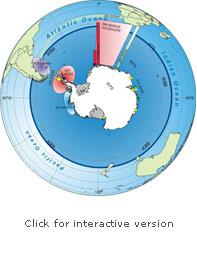ICED-IPY
The International Polar Year (IPY)
The first International Polar Year (IPY) in 1882-1883 was a collaborative, international effort researching the Polar Regions. Fifty years later (1932-1933) a second IPY occurred and in 1957-58 came the International Geophysical Year, also inpired by the IPY. These initiatives involved intense periods of interdisciplinary research, collecting a broad range of measurements on the state of the Polar Regions. Fifty years on, technological developments such as earth observation satellites, autonomous vehicles and molecular biology techniques offer enormous opportunities for a further quantum step upwards in our understanding of polar systems. To capitalise on this a second IPY was launched in March 2007 and ran until March 2009 to allow for two field seasons. This IPY also afforded an opportunity to engage the upcoming generation of young scientists and to further educate the public. For more information visit http://www.ipy.org. See below for details on ICED's involvement in the IPY.

Introduction to ICED-IPY
ICED submitted a proposal "ICED-IPY") to the International Polar Year committee. This was successfully endorsed and linked and coordinated 9 closely-related projects within a consortium entitled "Ecosystems and Biogeochemistry of the Southern Ocean." In addition, ICED-IPY was the primary link to other related Consortia. During the IPY a number of ICED-IPY cruises took place with the aim of providing new insights into some of the mechanisms controlling biogeochemical cycles and ecosystem structure in the Southern Ocean. Download ICED-IPY presentation.
EUR-OCEANS film on ICED-IPY
ICED-IPY Project Information
Click on the map (right) for information on ICED-IPY fieldwork. In addition to the information on the map and the table summarising the details of the ICED-IPY project fieldwork activities, updates will be posted below as they become available.
BONUS GOODHOPE - Biogeochemistry of the Southern Ocean: interactions between nutrients, dynamics, and ecosystem structure - aims to understand the interactions between the contemporary dynamics, circulation, biogeochemistry and geochemistry in the Southern Ocean Atlantic sector and its exchanges with the Indo-Atlantic connection in the Agulhas system.
CLIMANT is a group of polar scientists from Chile, Germany, France and Spain studying climate change through a pelagic-benthic coupling approach to the extremes of the Weddell Sea. CLIMANT scientists have recently participated in a Polarstern expedition to the Weddell Sea and Antarctic Peninsula.
SCACE - Synoptic circum-Antarctic climate-processes and ecosystem study. To examine the role of the Southern Ocean in the global climate SCACE will bring together a range of ocean science and climate disciplines. SCACE plans to make best use of the unique chance provided by the IPY to synoptically collect multi-national data on physical, chemical and biological variables at different Antarctic locations at the same time.
SOS-CLIMATE is the Brazilian oceanographic contribution to IPY. The field effort will cover shelf and shelf-slope regions across the Polar Front from the Antarctic Peninsula region to the Patagonian Shelf, investigating controls on plankton dynamics. Oceanographic cruises are planned for March 2007 and the Austral summers of 2007-08 and 2008-09. See also the article in the IMBER newsletter on Southern Ocean science during the International Polar Year which features SOS-CLIMATE.
ICED-IPY on Google Earth
ICED is developing a Google Earth layer to represent Southern Ocean ecosystem (and related) research beginning with that which took place during the IPY and aiming to build on this. This interactive map will be valuable for coordination of field activities on a large scale. The overall aim is to produce a Google Earth layer representing national and international SO fieldwork, with layers of information that can be viewed or hidden as required.To contribute information to this project please contact Rachel Cavanagh.
Southern Ocean Cruise Blog
One of the scientists on a British Antarctic Survey cruise is currently writing a blog for school children in Portual. This is mostly in Portuguese with small amounts of English translation. Visit the blog.








